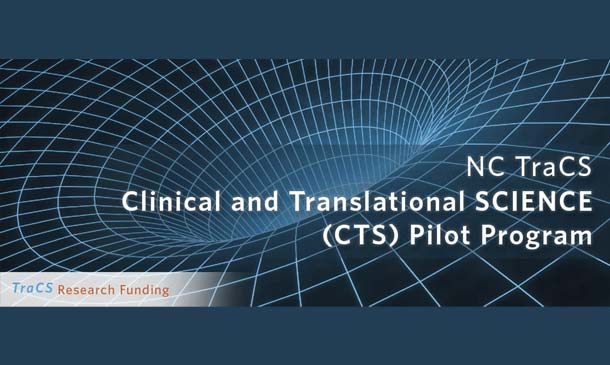TraCS CTS pilot award winners announced

The TraCS Clinical and Translational Science (CTS) pilot award program supports the field of investigation focused on understanding the scientific and operational principles underlying each step of the translational process.
Projects are intended to:
- explore innovative new leads, or new directions for established investigators;
- stimulate investigators from other areas to lend their expertise in research in CTS; and
- provide initial support to establish proof of concept.
More about translational science and the award process »
The following projects have recently been awarded funding:
✓ Developing an Efficient Translational Pipeline for Biospecimen Collection
PI: Tessa Andermann, MD, MPH (Assistant Professor, Infectious Diseases/Medicine, School of Medicine)
Impact Statement: “We propose the development of translational research infrastructure to improve access to clinical laboratory samples and to further translational science at UNC. Our pilot project will first target the urgent need for access to clinical isolates of multidrug-resistant pathogens in order to rapidly identify infectious outbreaks in North Carolina.”
✓ Illuminating the Prognostic Potential: Predicting the Drug Effects on Cancer Tumors with Deep Neural Network
PIs: Zhishan Guo, PhD (Associate Professor, Computer Science, NC State) and Ning Sui, PhD (Assistant Professor, Molecular and Structure Biochemistry, NC State)
Impact statement: “Our machine learning breakthrough promises to transform cancer care, ensuring fair and personalized drug efficacy predictions, expediting clinical trials, and shaping the future of equitable, personalized medicine with vast potential for daily clinical application across diverse cancer patient populations.”
✓ Developing Methods for Gene Expression Analysis of Antiplatelet Drug Exposure
PI: Kevin Friede, MD (Assistant Professor, Cardiology/Medicine, School of Medicine)
Impact Statement: “Gene expression data available in biorepositories is underexploited due to complexity of data analysis and limited techniques for external validation. This proposal aims to demonstrate that these barriers can be overcome, allowing for significant expansion of research devoted to ‘omics in large datasets.”
✓ Large Language Models to Facilitate Developing AI Approaches Identifying Abnormalities Within Medical Images
PI: Weili Lin, PhD (Professor, Radiology & Biomedical Engineering, Director, Biomedical Research Imaging Center, School of Medicine)
Impact Statement: “The proposed approaches are clinically impactful and highly translational by mitigating one of the major impediments for developing AI approaches in medical imaging – the need to manually annotate abnormalities in images. The proposed approaches are applicable to medical disciplines beyond Radiology, e.g., Dermatology and Pathology, where images are also widely employed in daily clinical practices and can easily integrate EHR information to further improve the robustness of AI algorithms.”
✓ Using Ultrasound to Evaluate Muscular Characteristics in Older Adults and their Correlations with Function
PI: John Batsis, MD (Associate Professor, Medicine-Geriatric Medicine, School of Medicine)
Impact Statement: "The information gained in this study will allow the investigators to tailor the intervention to specific individuals – getting the right intervention to the right patient. The risks of the study are minimal to individuals in relation to the potential benefits they may receive. Outcomes of this research could include novel diagnostic and more precise diagnoses, new and more rational use of therapies, and improved understanding of why some people remain healthy despite exposures and risk factors for disease."
Now accepting applications for Cycle 4
We are currently seeking proposals for Cycle 4 that focus on understanding a scientific or operational principle underlying a step of the translational research process, with the goal of developing generalizable principles to accelerate translation.
Submissions due: August 13, 2024.
Learn more about this opportunity at tracs.unc.edu/services/pilot-program/cts
Questions regarding applicant eligibility may be directed by email to This email address is being protected from spambots. You need JavaScript enabled to view it., Director, TraCS Innovations Program.



